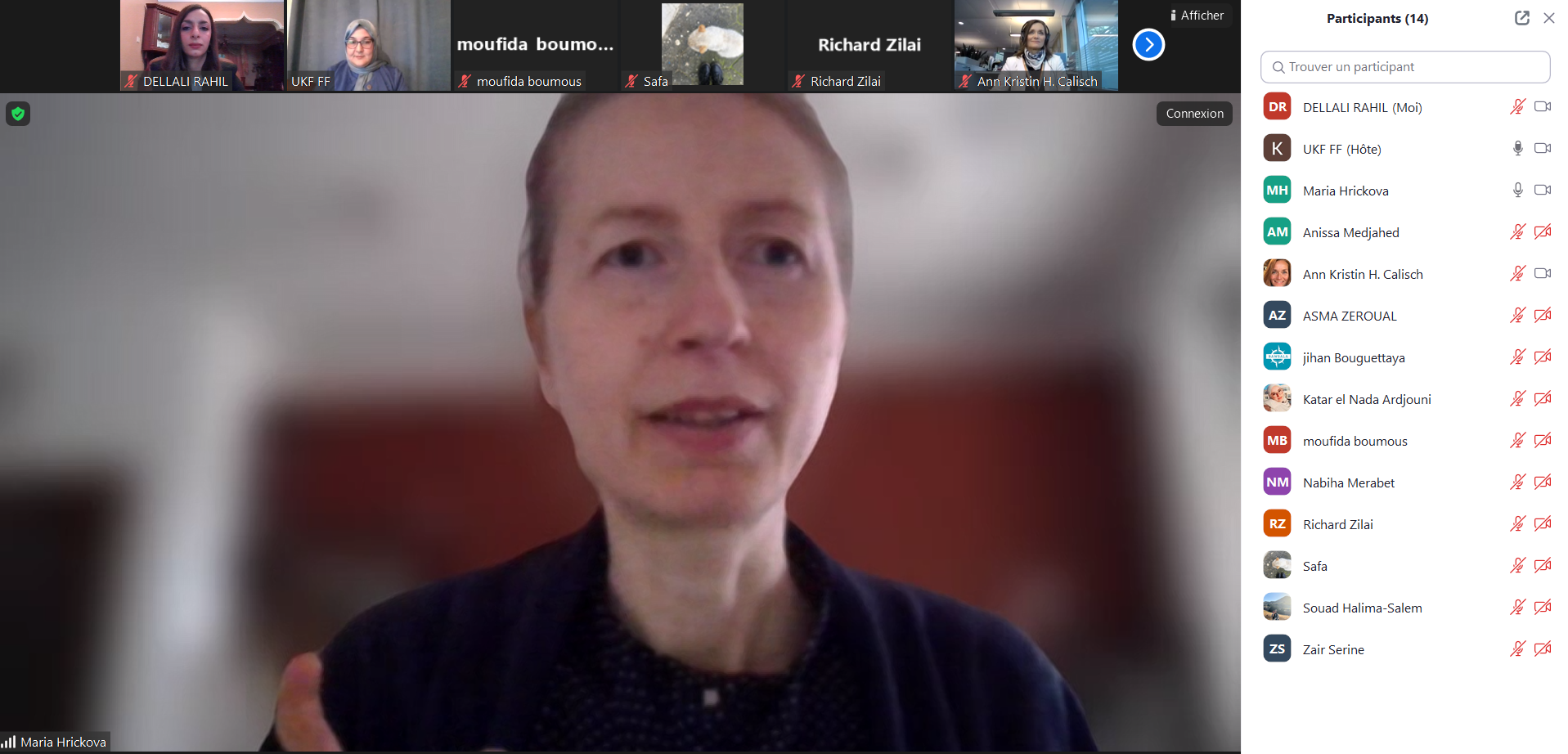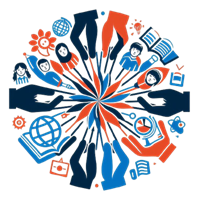Blog entry by Fella Benabed

On February 7, 2024, Mária Hricková, myself (Fella Benabed), and a group of students from Algeria and Slovakia, animated an event entitled “Collaborative Online International Learning for Sustainable Development Goals” as part of the 7th SDGs conference at Bergen University, Norway. The topic of this year was “The Role of Universities in Transformative Change.” Our event, which lasted 90 minutes, was divided into three stages. Mária Hricková started by presenting the Erasmus+ project “Fostering Students’ Interdisciplinary Competence through the Action-Oriented Approach & COIL” (led by Nitra University in Slovakia, in partnerships with universities and high schools from Algeria, Czechia, Hungary, Poland, and Romania).
After that, I talked about the first COIL cohort organized by Badji Mokhtar-Annaba University, in the autumn of 2023, on the topic of Sustainable Development Goals. The objectives of the COIL workshops were to help learners understand the meaning of sustainability and its four pillars, identify the United Nations’ Sustainable Development Goals (SDGs), reflect on their contributions to the achievement of these SDGs, and benefit from collaborative learning and internationalization at home with peers from diverse backgrounds. The activities were designed to equip learners with the knowledge and skills necessary to take action for the SDGs, allowing them to become effective change-makers today and responsible decision-makers tomorrow.
I organized the workshops in terms of the four pillars of sustainability:
Human Sustainability stresses the need to provide the conditions in which human beings can realize their full potential, like the reduction of poverty and hunger, as well as the investment in healthcare and education.
Social Sustainability emphasizes the interdependencies amongst individuals and communities, cultivating an environment of global justice and mutual respect.
Economic Sustainability goes beyond the traditional conception of economic growth and moves into the qualitative aspects of economic development. It is not only about profit, but also about how that profit is achieved, who benefits from it, and the impacts it has on other pillars of sustainability. An economically sustainable model is characterized by equitable distribution, social welfare, and environmental preservation.
Environmental Sustainability emphasizes the necessity of preserving the ecosystem; it is not only about conservation but also about restoration. In a world struggling with climate change, environmental sustainability involves measures to adapt to change and build resilience against future uncertainties.
Despite their interrelatedness, I tried to classify these 17 SDGs into the previously mentioned thematic clusters and I came up with the following plan for every workshop.
Human Sustainability (SDGs 1, 2, 3, and 4)
Ø Social Sustainability (SDGs 5 and 10)
Ø Economic Sustainability (SDGs 8, 9, 11, and 12)
Ø Environmental Sustainability (SDGs 6, 7, 13, 14, and 15)
Ø Global Peace and Partnership (SDGs 16 and 17)
In each of these workshops, I tried to design thought-provoking activities to raise students’ awareness and inspire them to take action for the SDGs. For instance, we had whole-group discussions on each SDG using pictures from the UN Development program. We also had individual reflections in which students were asked to analyze the impacts of the COVID-19 pandemic on SDGs 1, 2, 3, and 4, thinking of possible solutions to avoid similar impacts in the future. We equally had group work in breakout rooms, like an activity in which students watched a video on a sports competition where a black girl was denied her medal. I first asked the students about the emotions raised by this scene, aiming to develop their feelings of empathy and intolerance towards injustice. I then asked them to share stories about a form of discrimination they might have personally experienced, watched on the media, or read about somewhere. In another activity, I asked students to notice and compare the carbon footprint of their own countries, explaining why they reached this alarming consumption of natural resources and how they can reduce it. Of all activities, the one on blogging was the most popular, as many students mentioned it in their post-COIL reflections, and my students at Annaba University are eager to start plogging activities very soon. Finally, students were asked to read the United Nations’ document “The Lazy Person’s Guide to Saving the World,” and then reflect on their initial level concerning the SDGs and how it has evolved throughout the 6 workshops.
In the third stage of the event organized as part of the SDGs conference in Bergen, five students, Nabiha Merabet, Malak Ayette Guellati, Jihan Bouguettaya, Richard Zilai, and Rassim Morakchi took turns to reflect on their learning during the workshops and their ensuing actions, or determinations to take action, for the SDGs. Then, Safa, Souad, and Katar el Nada read excerpts from the assignments of Katarina Malatinova, Milota Mucolova, Natalia Jaworska, Lucia Sandlnova, Katarina Kricikova, Sebastian Pawlik, Bianca Cicáková who attended the COIL cohort but could not make it to the event. The last stage of the event will be devoted to a debate between the audience and the speakers.
The key takeaway from the students’ contributions is not to underestimate the importance of individual initiatives, illustrating the story of the Colibri or hummingbird: The forest is burning … The alarmed animals are watching, feeling powerless, except the smallest one, the Colibri who says: “I can’t watch this happen without doing anything!” The bird flies to the closest stream, carries a drop of water, and throws it on the fire. It keeps repeating the same action again and again, as lively as possible. Bigger animals are still watching helplessly, thinking that the efforts of this little bird are useless in front of a big fire. Without stopping, the Colibri says: “I am doing my part; I will do the best possible to save my land.”
What is of great interest to us, as educators, is that many students expressed their amazement (one of them used the word “shock”) on how the SDGs are not part of official programs, at least in the educational institutions that are part of this Erasmus+ project. What I mostly enjoyed in this experiment was the students’ raised awareness and determination to spread the word about SDGs; some of them said that they had already started talking about this topic with their relatives and friends, and for me, as an educator, this is the most rewarding experience. For this reason, the next COIL cohort will focus on SDG 3: Good Health and Wellbeing.
